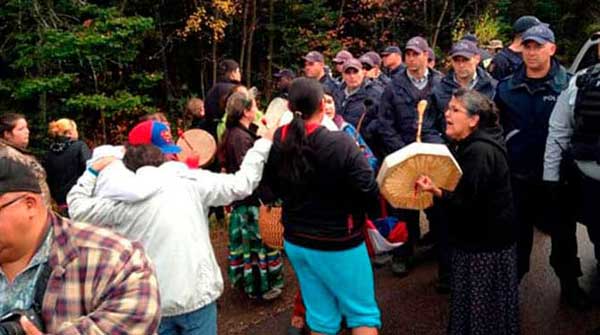Election stakes high as NDP’s hidden Indigenous reconciliation agenda threatens provincial sovereignty, says Geoffrey Moyse
Geoffrey Moyse, a retired senior British Columbia government lawyer who advised six successive governments on Aboriginal law, is raising serious concerns about what he calls the BC NDP’s “radical reconciliation agenda.” According to Moyse, the public has been kept in the dark, and this hidden agenda could have dire consequences for the future of British Columbia.
Moyse, who spent 30 years advising governments, is critical of Premier David Eby’s plan to jointly manage public lands with Indigenous governments while bypassing the voice of British Columbians. Moyse insists that this is not the “conspiracy theory” Eby claims it is.
 |
| Recommended |
| Beaver Lake Cree Nation’s fight for treaty rights drags on
|
| Is equality before the law under threat in Canada?
|
| Land claims largest deterrent to mining investment in B.C.
|
“The NDP seems to believe that the United Nations Declaration on the Rights of Indigenous Peoples (UNDRIP) trumps the Canadian constitution,” says Moyse. “That ideological approach paves the way to unilaterally hand over public lands or decision-making authority to veto government decisions over those public lands to Indigenous communities, without public consultation or engagement, and with no requirement for proof of claims.”
Moyse argues that the NDP will continue to operate behind closed doors on this issue if it wins the October election. “I would anticipate that the current NDP government in Victoria believes that an election win in October will allow them to continue to secretly do as they please when it comes to radical policy changes around Indigenous reconciliation, and the unilateral handover of public lands and/or effective veto power for Indigenous governments over public land decisions based solely on unproven Indigenous claims to Aboriginal title and UNDRIP,” he says.
“The NDP, and some academic elites, believe Canada and British Columbia are illegitimate. But the other side of the reconciliation equation recognizes Canada as a legitimate state that has been seeking to balance the pre-existing rights of Indigenous people with the sovereignty of Canada under the Canadian Constitution Act of 1982.”
Moyse is warning that if the NDP wins re-election, their “over the top” approach to UNDRIP will deepen divisions between Indigenous communities and the broader public, who are largely unaware of what’s being done behind the scenes. “The core of our society is now under threat, as is the very existence of this province,” he says. “The NDP are carrying on with their radical reconciliation agenda in backrooms and may well be looking to ultimately turn the entire provincial public land base into Aboriginal title lands under the ownership and control of less than six percent of the provincial population, who will not be elected by anyone outside of their internal communities. Any government that generates public policy in secret cannot be trusted.”
Moyse also points out that the NDP’s assurances about private land being protected are misleading. “The NDP also ‘pretend to protect private lands’ from the legal effects of their unilateral and likely unconstitutional Aboriginal title declarations,” he says.
“But rest assured that private lands and Crown tenures will nonetheless be in legal jeopardy under this government’s approach,” Moyse says. “It’s time for five million British Columbians to ask why (they are) being excluded from the NDP’s Indigenous reconciliation agenda. When did British Columbians give their government permission to give away the public land base in BC? When did British Columbians approve having to ask Indigenous permission in the future to use lands that have been provincial, public lands?”
Moyse takes issue with what he sees as the NDP’s approach to accepting Indigenous land claims without requiring proof. He points to Haida Gwaii, where the government handed over 100 percent of the claimed land without verifying the claims in court. “When Canadian law has been invoked in court, land claim court cases have resulted in findings of Aboriginal title to just six percent or less of the lands being claimed, far different than the 100 percent of Haida Gwaii offered by this government through what they deem to be ‘negotiations,’” he explains.
“The NDP’s unilateral Haida reconciliation template bypasses the need for engagement with the public or private landowners,” Moyse says. “Their new template also seems to largely avoid involving the federal government. Meanwhile, their commitment to tripartite treaty negotiations, which is the gold standard for reconciliation in Canada, appears wholly underwhelming, replaced in large part by secretly negotiated bilateral ‘reconciliation agreements’ that leave out British Columbians.”
Moyse leaves no doubt about what he believes is at stake: “The NDP appears to be wholly committed to disrupting or even dismantling British Columbia as they sideline the more than five million people who call British Columbia home.”
He urges voters to take action before it’s too late. “Before British Columbians vote on October 19, they should demand that every party ‘come clean’ on their intentions for Indigenous reconciliation.”
To interview Geoffrey Moyse, click here.
| Staff
Explore more on Aboriginal reconciliations, Aboriginal land claims, Eby government
The opinions expressed by our columnists and contributors are theirs alone and do not inherently or expressly reflect the views of our publication.
Troy Media
Troy Media is an editorial content provider to media outlets and its own hosted community news outlets across Canada.

